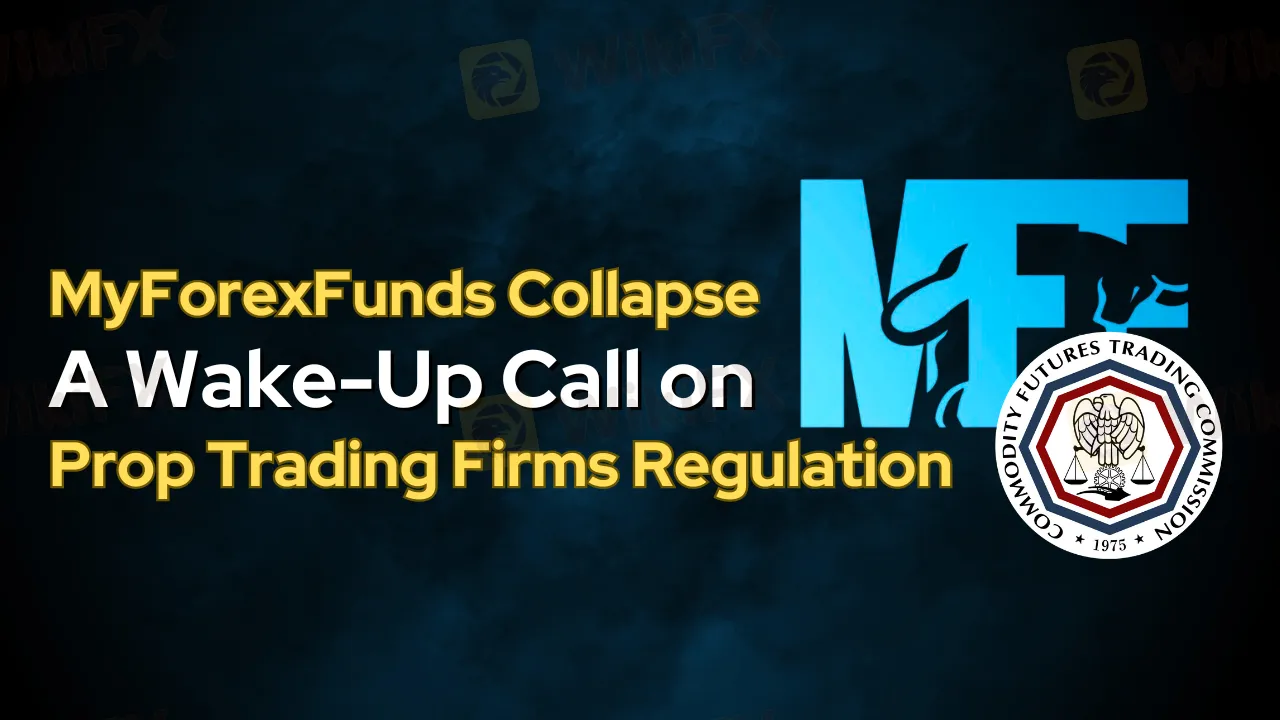简体中文
繁體中文
English
Pусский
日本語
ภาษาไทย
Tiếng Việt
Bahasa Indonesia
Español
हिन्दी
Filippiiniläinen
Français
Deutsch
Português
Türkçe
한국어
العربية
MyForexFunds Collapse: A Wake-Up Call on Prop Trading Firms Regulation
Abstract:MyForexFunds collapse exposes shady practices in Forex trading. Learn about the allegations, Ponzi-like schemes, and why choosing the right prop trading firm is crucial. Stay informed with this cautionary tale.

Introduction
The collapse of MyForexFunds (MFF) has sent shockwaves across the Forex trading community. Recently, the Commodity Futures Trading Commission (CFTC) has filed serious allegations against the company, freezing its assets for scrutiny. The case against MFF has reignited conversations around the importance of prop trading firms' regulation and the different business models they employ.
The Rise and Fall of MyForexFunds
Once considered one of the biggest prop trading firms in the market, MyForexFunds promised traders the chance to trade with large funded accounts. The company managed to attract 135,000 customers since November 2021 and amassed at least $310 million in trader's fees. However, despite its massive appeal, the firm came under fire from the CFTC for operating with a flawed business model.
The Allegations
The CFTC charges against MyForexFunds primarily revolve around their false claims of a win-win situation for traders. They allegedly misled customers by stating, “We only make money when you do,” which turned out to be untrue. In reality, the firm acted as the counterparty to all trades taken by its customers, minimizing the chance of them making any profits. This was accomplished through tactics like misleading advertisements, manipulating trade commissions, and deploying custom software to introduce slippage into trades.

Bee Booking and Ponzi Schemes
MFF's business model was what's known in industry jargon as “bee booking,” a model wherein the losses of one group of traders finance the wins of another. Bee booking is considered a red flag, often associated with Ponzi or Pyramid-like schemes. Simply put, MyForexFunds used the fees from losing traders to pay out to winning traders, creating an unsustainable business model.
The Importance of Choosing the Right Prop Trading Firm
The downfall of MyForexFunds serves as a dire warning for traders to be cautious when selecting a prop trading firm. Traders should look for firms that use reliable business models, like the A-Book model, which offers more transparency and is regulated by established financial authorities.
What Traders Can Do Now
If you're a trader who has been affected by the MFF collapse, it's essential to stay updated on the CFTC's actions and consider seeking legal advice. Meanwhile, it's vital for all traders to perform due diligence when choosing a prop trading firm to prevent falling into a similar trap.
Summary
The CFTC charges against MyForexFunds have shed light on the darker corners of the Forex funds market. The allegations indicate a deliberate attempt by MFF to prevent traders from profiting, using a business model akin to a Ponzi scheme. This incident serves as a cautionary tale, stressing the importance of prop trading firms' regulation and the need for traders to be vigilant when choosing a platform.
Stay updated on the latest news, by installing the WikiFX App on your smartphone.
Download the App here: https://www.wikifx.com/en/download.html

Disclaimer:
The views in this article only represent the author's personal views, and do not constitute investment advice on this platform. This platform does not guarantee the accuracy, completeness and timeliness of the information in the article, and will not be liable for any loss caused by the use of or reliance on the information in the article.
Read more

Webull Canada Expands Options Trading to TFSAs and RRSPs
Webull Canada launches options trading for TFSAs and RRSPs, offering Canadian investors tax-free growth and retirement savings optimization opportunities.

WikiFX Review: Is IQ Option trustworthy?
IQ Option is catching our eye as it seems to be a trending topic. For those who want to know whether IQ Option is a reliable broker, WikiFX made this article to help you better understand this broker.

Pros and Cons of Choosing Unregulated Forex Brokers
Discover the pros and cons of unregulated forex brokers, explore risks, benefits, and key features, and learn how to evaluate their credibility with the WikiFX app.

5 Questions to Ask Yourself Before Taking a Trade
Before executing any trade, traders should pause and ask themselves critical questions to ensure they are making rational and well-informed decisions. Here are five questions to help you reflect on your strategy, manage risk, and control emotions before entering the market.
WikiFX Broker
Latest News
Spotware Unveils cTrader Store, Global Marketplace for Algo Creators
Elderly Trader Loses RM2.1M in WhatsApp Forex Scam
Gigamax Scam: Tracking Key Suspects in RM7 Million Crypto Fraud
Singaporean Arrested in Thailand for 22.4 Million Baht Crypto Scam
Trader Turns $27 Into $52M With PEPE Coin, Breaking Records
ASIC Sues HSBC Australia Over $23M Scam Failures
WikiFX Review: Is IQ Option trustworthy?
5 Questions to Ask Yourself Before Taking a Trade
FCA Seeks Input to Shape UK Crypto Market Regulations
Understanding the Impact of Interest Rate Changes on Forex Markets
Currency Calculator


